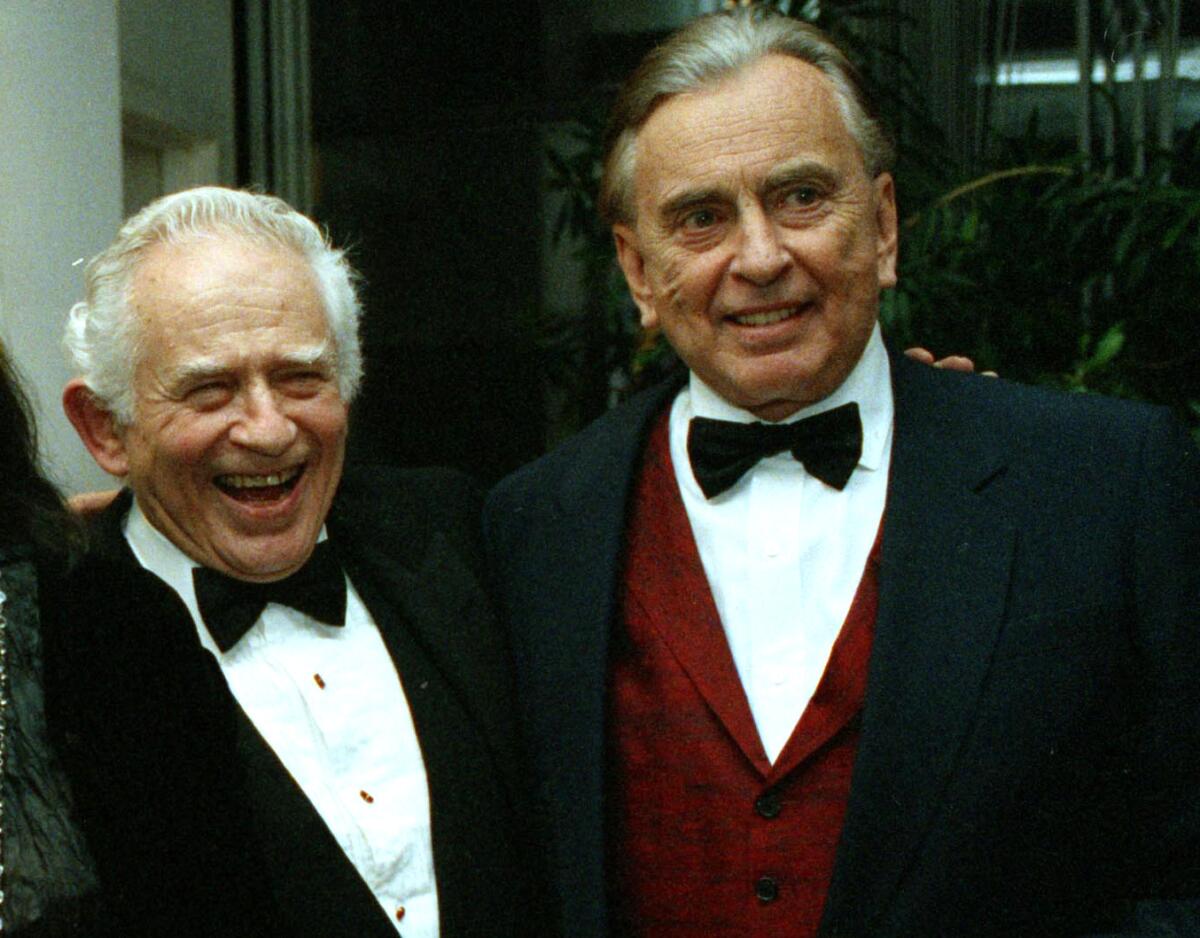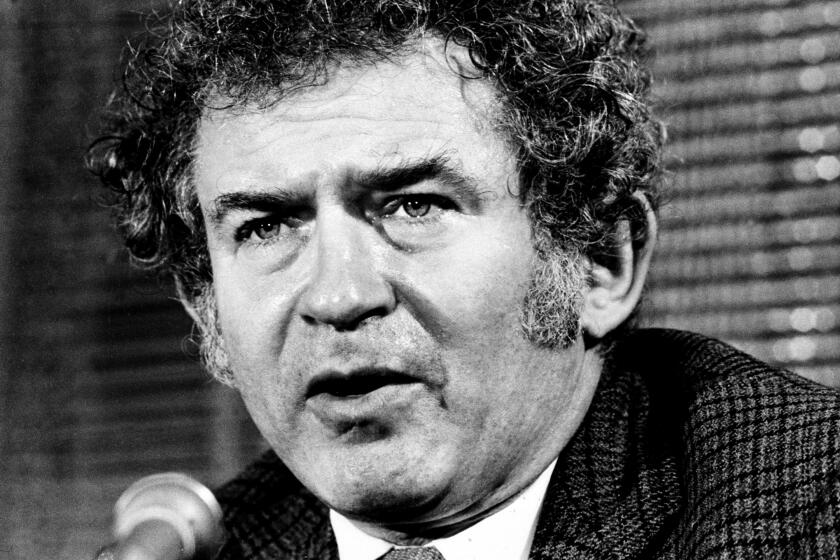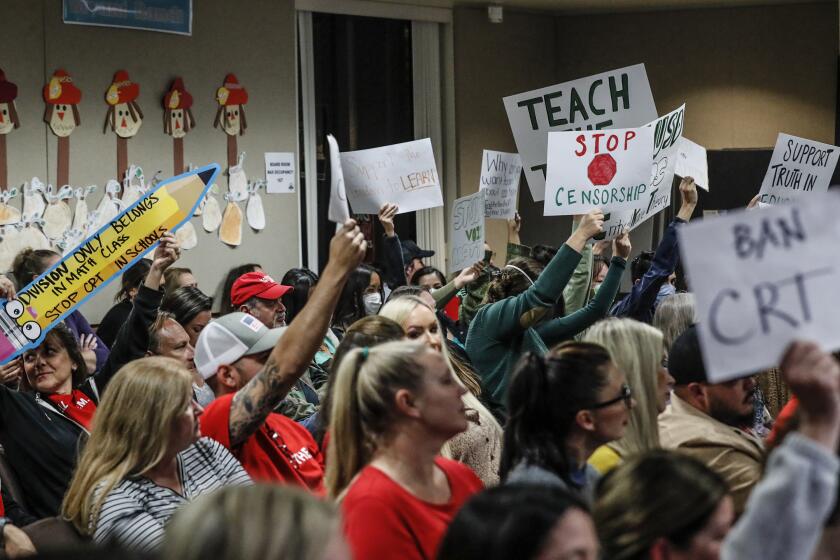Norman Mailer is far from canceled. He’s history

- Share via
Let’s say, for the sake of argument, that Norman Mailer would not be pleased to be canceled in 2022. That’s purportedly what happened this week, sort of, and while the inciting event is murky at best, the questions and anxieties it raises about the legacy of Mailer, a Pulitzer Prize winner who died in 2007, have struck a chord.
To begin at the beginning, the upstart newsletter the Ankler published a story by Michael Wolff (yes, “Fire and Fury” Michael Wolff) alleging that a forthcoming collection of Mailer’s political writing had been “canceled” by his publisher due to objections by a “junior staffer” to the 1957 essay “The White Negro.” This immediately unleashed dueling choruses: One was outraged over Mailer’s cancellation (Joyce Carol Oates, Thomas Chatterton Williams); the other was sharply critical of Mailer’s legacy, noting misogyny and violence in his writing and life. (In 1960, he stabbed his wife Adele Morales, narrowly missing her heart.)
The Wolff account was soon challenged on several fronts: The publisher, Random House, said it never had the book under contract; a selection of Random House’s junior staffers told the New Republic they could not possibly cancel a book; and a prominent Black feminist Wolff roped into his account for no reason had to protest on social media that she was not involved whatsoever in any discussions related to Mailer. But that wasn’t the end of it.
Now that Random House would not be publishing the now-well-publicized future book, Mailer literary agent Andrew Wylie confirmed that the collection would be published instead by Skyhorse, which has become the publisher of last resort for the shunned (i.e., Woody Allen).
Skyhorse Publishing’s acquisition of a collection of the late Norman Mailer’s essays comes after reports that his regular publisher declined it.
Why this fuss over Mailer now, 15 years after his death? Because we’re coming up on his centenary. Born in 1923 in Long Branch, N.J., Mailer fought in World War II and based his award-winning first novel, “The Naked and the Dead,” on that experience. He soon expanded his vision, jumping into the issues of the day. He wrote a column for the Village Voice, alternately embraced and tussled with the counterculture, showed up on TV shows, wrote acclaimed nonfiction and less acclaimed fiction, ran for mayor of New York City, obsessed about masculinity in fairly toxic ways, stabbed his wife, made enemies of his friends and head-butted Gore Vidal. He was, for better or for worse, one of the most prominent literary figures of the second half of the 20th century.
And he’ll be celebrated into the 21st. Skyhorse confirms it will publish his as-yet-untitled essay collection. The Library of America will publish “Norman Mailer: ‘The Naked and the Dead’ and Selected Letters, 1945-1946” in time for his 100th next January. The Norman Mailer Society plans to celebrate the milestone during its annual conference in 2023. And in the same year, the Louisiana State University Press is slated to publish “Norman Mailer at 100: Conversations, Correlations, Confrontations,” by Robert Begiebing.
So what we have is a Mailer not canceled but brought back to life; he is once again the subject of controversy. I imagine that would suit him just fine.
It seems to me, as a Gen X critic who’s been watching this play out over social media, that there’s a rough generational divide over whether Mailer should be read at all. Many boomers, who grew up reading Mailer, seeing him regularly on TV, in gossip columns and on college campus podia, took him as a given. Millennials and Gen Y, perhaps less likely to encounter his work on syllabi, sensibly judge his more outrageous acts — writing positively about rape, stabbing Morales, advocating for the release of a man from prison who murdered a waiter weeks later — and give him a thumbs-down. I don’t know, maybe they hate his writing too. As a Gen Xer, I’m caught in the middle: I like some of his writing very much, bristle at many of his ideas and deplore his violence.
How Skyhorse Publishing became a house of last resort for Dershowtiz, Keillor, anti-vaxxers and anti-maskers — and a cancellation target itself.
“His work is admittedly challenging and requires patience and a consideration of historical and cultural context,” Mailer scholar Maggie McKinley of Harper College told me via email. Addressing the essay “The White Negro,” she wrote that, apart from its awful title, it “includes arguments that rest on problematic premises about race, masculinity and morality. But as I tell my students when I teach this essay, and as I try to emphasize in my scholarship on Mailer, these trouble spots in his writing are part of why it’s important to read and talk about his work.”
McKinley edited the anthology “Norman Mailer in Context,” published by Cambridge University Press in August. “Many readers are understandably uncomfortable with the way that Mailer presents masculinity, for example,” she wrote to me. “But by analyzing these representations, we can better articulate the cultural and individual anxieties, pressures and limitations surrounding definitions of gender that persist today.”
From 2022, we can look back on 20th century masculinity with a critical eye (I know, feminists have been doing this all along) and try to understand what made Mailer such a significant force. After he stabbed Morales (and she declined to press charges), he continued to have a lasting role as a public intellectual until the end of his life, 47 years later. His professional cohort, and his readers, didn’t care. If you think that sounds like an unhealthy societal choice, I agree. But it’s something worthy of study.
And we can still find his books if we look. That’s different from “The 1619 Project” and other critical race theory books, which are being banned in states across the nation, from Florida and Idaho to Texas and Indiana. In case you wanted to know what literal cancellation really looks like.
An Orange County school district’s debate over critical race theory exemplifies how a hard-to-define academic concept has become a proxy for uncomfortable conversations about racial injustice in the U.S.
Kellogg is a former books editor of The Times. She can be found on Twitter @paperhaus.
More to Read
Sign up for our Book Club newsletter
Get the latest news, events and more from the Los Angeles Times Book Club, and help us get L.A. reading and talking.
You may occasionally receive promotional content from the Los Angeles Times.











